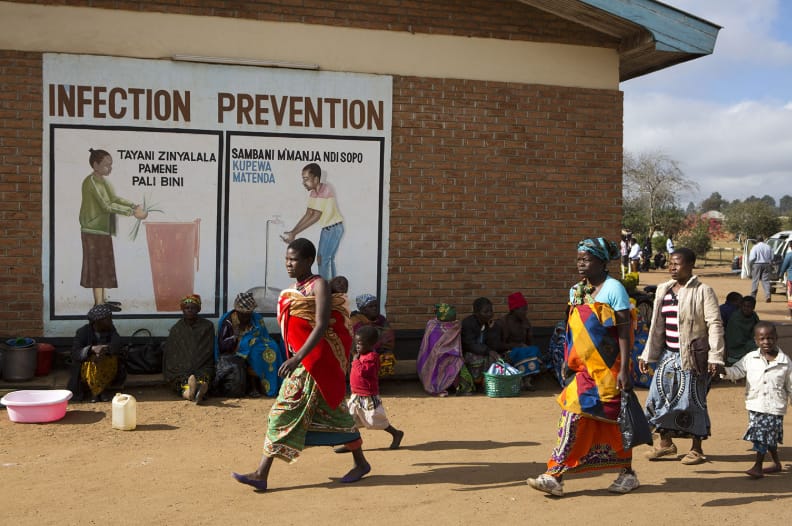- At least 13.5 million people to miss out on vaccinations due to postponement of campaigns and interruptions in routine vaccinations, with millions more likely to follow
- Gavi, the Vaccine Alliance is urgently providing support for countries’ COVID-19 response and in addition is ready to support mass vaccination campaigns once lockdowns finish
- Dr Seth Berkley: ‘The legacy of COVID-19 must not include the global resurgence of other killers like measles and polio’
Disruptions caused by the COVID-19 pandemic are likely to have a devastating impact on immunisation programmes in the world’s least-developed countries, according to a new analysis by Gavi, the Vaccine Alliance. Immediate delays to vaccination campaigns and routine introductions will mean at least 13.5 million people in 14 of the world’s least-developed countries will not be protected against diseases like measles, polio and HPV, with millions more likely to follow.
The Vaccine Alliance and its partners are urgently working to keep immunisation programmes running, however at least 21 low and middle-income countries are already reporting vaccine shortages as a result of border closures and disruptions to air travel.
So far, 14 major Gavi-supported vaccination campaigns against polio, measles, cholera, HPV, yellow fever and meningitis have been postponed, as have four national vaccine introductions. Collectively these would have immunised more than 13.5 million people. The number of people missing out on vaccines is likely to rise substantially as Gavi expects a significant proportion of planned vaccine campaigns to be postponed in the coming months, with routine immunisation programmes also severely impacted as key staff are redeployed and communities observe physical distancing.
Gavi is redirecting 10% of its funding for health systems for immediate use, until more substantial support starts to flow, towards supporting countries’ response to COVID-19. This includes support for personal protective equipment (PPE), diagnostics, training and communications campaigns. Gavi is ready to work with Alliance partners to support mass immunisation campaigns once emergency measures are lifted and, assuming successful fundraising for the 2021-25 period, help repair health systems, boost vaccine coverage rates and protect the next generation against disease in the coming years.
“The world’s poorest countries need the help of the international community more than ever to help mitigate the worst impacts of the COVID-19 pandemic and to ensure that they are not hit by an even higher death toll from preventable diseases which can further overwhelm the health systems,” said Dr Seth Berkley, CEO of Gavi, the Vaccine Alliance. “Our Alliance is working hard to prepare health systems and health workers in these countries for the pandemic but we are also doing everything we can at the same time to prevent further loss of life by ensuring routine immunisations, where possible, continue and that mass vaccination campaigns take place once the immediate crisis is over. Children missing out now must not go their whole lives without protection from disease. The legacy of COVID-19 must not include the global resurgence of other killers like measles and polio.”
A Gavi analysis of Imperial College modelling suggests COVID-19 could lead to 12.9 million deaths in the 73 Gavi-supported countries without any mitigation, compared to 0.9 million deaths with full suppression measures. The latter will be a huge challenge to implement in impoverished communities which cannot afford long periods at home.
In addition to Gavi’s immediate support for health systems in the countries where it is active, Gavi is also helping the development of COVID-19 vaccine candidates, as well as supporting efforts to manufacture, purchase and deliver vaccines to those that need them once they are available.
On Monday 30 March the WHO’s Strategic Advisory Group of Experts on Immunisation (SAGE) recommended that all one-off preventive vaccination campaigns should cease as countries focus on COVID-19 response, however routine immunisation should continue where possible. The Global Polio Eradication Initiative (GPEI) has paused all polio vaccination campaigns.
Routine immunisation, including vaccines against polio, continues in most countries for now, though mainly in fixed facilities with strict guidelines on hygiene and physical distancing. With the expansion of nationwide lockdowns across the developing world it is likely more and more routine immunisation programmes will close temporarily. The suspension of outreach activities, in which health workers visit communities to proactively offer routine vaccinations, is likely to have an immediate impact on vaccine coverage.
Measles outbreaks are currently ongoing in several countries, including the Democratic Republic of Congo and Central African Republic. The DRC outbreak is currently the world’s largest, affecting over 300,000 people since it began in 2019, with more than 6,000 deaths – nearly three times as many as from Ebola as part of the outbreak in the country.

